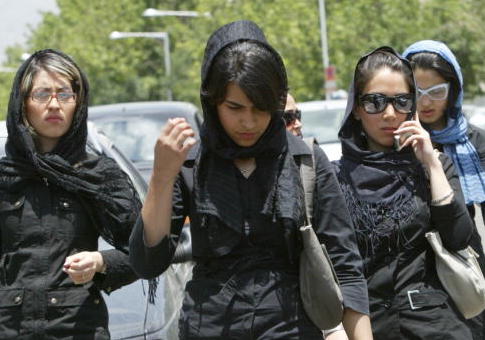An Iranian woman who removed her headscarf in public has been given a two-year prison sentence.
Tehran prosecutor Abbas Jafari-Dolatabadi did not identify the woman but said she was convicted of "encouraging moral corruption," the BBC reports.
The woman was, however, identified as Narges Hosseini by her attorney, Nasrin Sotoudeh.
Hosseini will serve three months of the sentence without parole and the remaining 21 months will be suspended. Jafari-Dolatabadi did not specify Hosseini's condition but said she was "in need of long-term medical treatment and has to be seen by a psychiatrist."
The prosecutor argued the sentence shouldn't be suspended and she should serve the full two years.
Hosseini was arrested after she removed her headscarf in protest of the mandated clothing item for women. Many women in Iran have been similarly arrested in recent months for removing their headscarves, but most have released from custody without charges.
Iran’s supreme leader, Ayatollah Ali Khamenei, vehemently opposes the protests, the Washington Post reported. Khamenei responded to protests on Twitter Thursday, attacking Western countries for the immodesty of their women and promoting the value of the headscarf, or jijab.
"By promoting modest dress (#hijab), #Islam has blocked the path which would lead women to such a deviant lifestyle," Khamenei tweeted in English. "Iranian women today, declare their . . . independence and export it to the world while preserving their #hijab."
But not everyone in Iran has taken as hard of line as Khamenei, a fact made clear by protests by women over the past few months.
President Hassan Rouhani, a moderate who has championed change, has urged Iran’s ruling clerics to relax the social restrictions.
In December, Tehran’s police chief said his deputies would no longer arrest women for violating the Islamic dress code, and the government also recently rolled out a public relations campaign targeting the harassment of women on the street and the subway.
In February, Rouhani’s office released a 2014 report on Iranian attitudes toward the hijab. According to the study, 49.8 percent of Iranians oppose government intervention to enforce the veil, which they consider to be a private matter.
But as more and more women have staged individual protests, Tehran’s police chief, Gen. Hossein Rahimi, again took a hard line, saying late last month that his forces "will not tolerate this kind of behavior."
Sotoudeh, the human rights lawyer who represented Hosseini, said Iranian women "don’t put all their hope in a government that has never taken a single step" to improve their rights.
Sentences such as the one against Hosseini "will only increase solidarity among women in the movement," she added.
